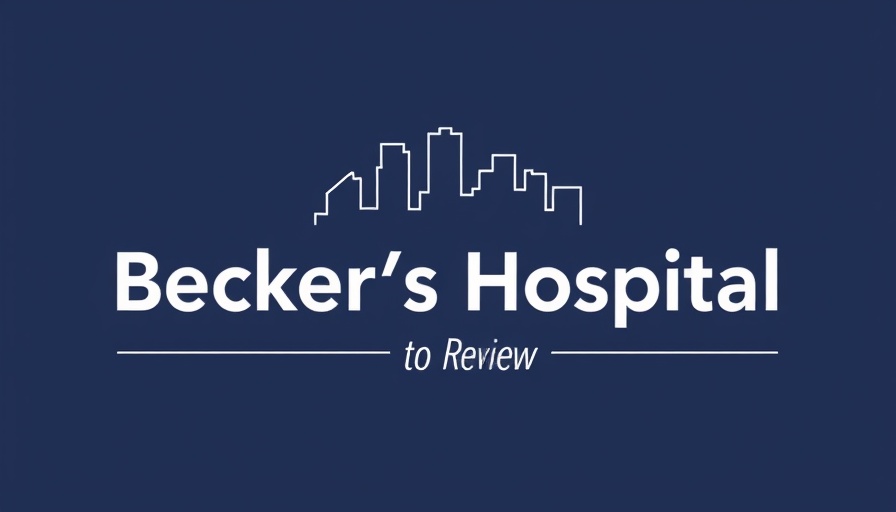
Understanding Crozer Health's Closure: A Community Crisis
In an overwhelming decision, Crozer Health, based in Upland, Pennsylvania, is set to shut down its operations, impacting more than 2,600 employees. This turn of events has resonated deeply within the community, raising questions about the future of healthcare accessibility in the region. Understanding this situation is crucial for healthcare professionals, especially independent providers, who are intricately linked to local patient care.
The Timeline of Events Leading to Closure
After months of court proceedings and negotiations with various stakeholders, the parent company Prospect Medical Holdings announced that it would wind down operations following unsuccessful attempts to sell crucial facilities. Crozer's CEO Tony Esposito stepped down just days before the closure announcement, highlighting the turmoil within the organization.
Despite attempts to find a buyer, including talks with University of Pennsylvania Health System, no prospective buyers emerged willing to proceed with negotiations, causing Prospect to take this drastic step. This closure, set to occur between April 25 and May 2, involves laying off 2,651 employees across eight facilities—a significant loss for the healthcare workforce.
Local Impact: More than Just Jobs
The repercussions of Crozer's closure extend beyond job losses. With the closure of hospitals like Crozer-Chester Medical Center, the community faces immediate concerns regarding healthcare access. For independent healthcare providers and community pharmacies, this creates a ripple effect in patient engagement and healthcare delivery.
As a supportive resource for patients, independent healthcare practitioners will have to adapt quickly. They should consider implementing telehealth revenue strategies to ensure continuity of care for patients seeking medical advice in the wake of local hospital closures. Additionally, enhancing patient engagement tools will be essential to retain patients during this transition period.
Alternative Routes: What’s Next for Healthcare Providers?
The state attorney general's office has criticized Prospect's handling of Crozer, attributing the closure to their prioritization of profit over community health. This narrative serves as a cautionary tale for independent healthcare providers to remain vigilant about the financial health of their practices while ensuring patient care remains a priority. Diversifying revenue streams, such as patient engagement programs and remote therapeutic monitoring (RTM), could shield practices from similar vulnerabilities.
Emotional and Human Impact
For the community, the closure signifies more than just the loss of jobs—it’s a sense of fear and uncertainty about the future of healthcare. Employees, many of whom have dedicated years to their roles, are left scrambling for new opportunities. Anxiety within the community is palpable, sparking discussions about healthcare equity and the importance of accessible medical care.
Healthcare workers and patients alike must rally to advocate for community health needs. This situation emphasizes the importance of fostering strong relationships with local government and community health initiatives that prioritize patient needs over profit margins.
Future Predictions: Adapting to Change in Healthcare
Looking ahead, the closure of Crozer Health could herald a shift in how healthcare is approached within the region. Independent providers may increasingly become the cornerstone of community health, filling the gap left by large healthcare facilities. With growing demand for telehealth solutions and efficient practice automation, it's an opportune time for independent practices to innovate their service delivery.
Practitioners should be aware of AI phone agents and other healthcare automation tools that can streamline operations while enhancing patient interactions. By leveraging technology, healthcare providers can optimize their practices and adapt to the evolving landscape of patient care.
Conclusion: Call to Action for Healthcare Professionals
The closure of Crozer Health is a sobering reminder of the fragility of healthcare systems, particularly in less economically viable regions. For independent physicians, nurse practitioners, and healthcare providers, it’s crucial now more than ever to focus on strengthening practice resilience through strategic planning and community involvement. Emphasizing employee health benefits and robust patient outreach efforts will ultimately safeguard healthcare delivery in the community.
Let’s not forget the importance of advocating for systemic changes that prevent future closures of community facilities. Together, healthcare professionals can work towards a future where access to care is both equitable and sustainable.
 Add Row
Add Row  Add
Add 




 Add Row
Add Row  Add
Add 

Write A Comment